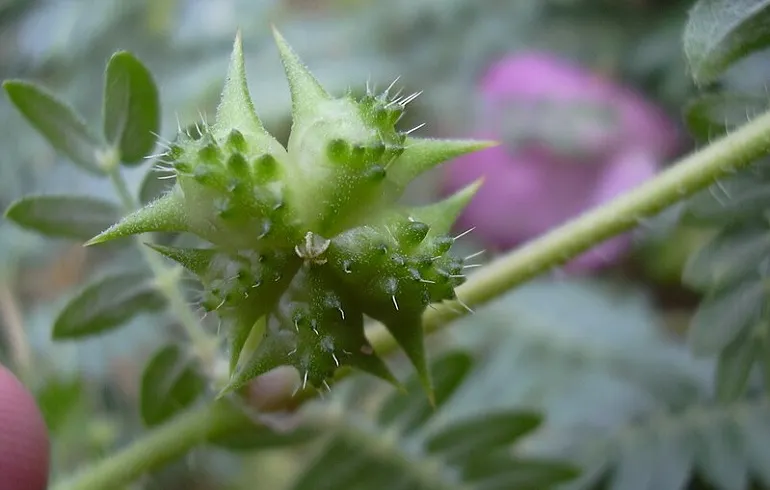In the realm of natural remedies, Tribulus Terrestris emerges as a botanical powerhouse with a storied history deeply woven into the tapestry of traditional medicine.
Known colloquially as puncture vine, this resilient flowering plant has traversed the landscapes of Ayurveda and Traditional Chinese Medicine, leaving an indelible mark for its perceived health benefits.
As scientific inquiry converges with age-old wisdom, this exploration seeks to unravel the secrets of Tribulus Terrestris, delving into its composition and acclaimed therapeutic potential.
Join us on this journey into the heart of nature’s pharmacopeia, where Tribulus Terrestris takes center stage in the pursuit of better well-being.
What is Tribulus Terrestris
Tribulus Terrestris, a formidable herb renowned for its potent health properties, belongs to the Zygophyllaceae family and thrives in various parts of the world.
Its spiky fruit, leaves, and roots contain bioactive compounds that form the crux of its therapeutic potential.
Tribulus Terrestris has been an integral part of traditional medicine across various cultures, including China, Greece, and India, for centuries. In ancient Greece, it was utilized as a diuretic and for enhancing self-confidence and mood in men.
In Chinese traditional medicine, it found application in addressing heart and blood vessel issues, as well as liver and kidney conditions.

Thriving best in subtropical climates, the subspecies with the highest concentration of active substances, especially saponins, is known as Tribulus terrestris Bulgarikum, contributing to the popularity of Bulgarian tribulus. This variation became a well-guarded secret among Bulgarian and Russian weightlifters.
In contemporary times, Tribulus terrestris is recognized as an aphrodisiac, adaptogen, and a valuable supporter of male reproductive health.
Tribulus Terrestris extract is derived from the fruits and roots of the plant. This concentrated form is often used in supplements, harnessing the plant’s bioactive compounds. These extracts are believed to be responsible for the herb’s therapeutic effects.
Tribulus Terrestris Active Substances
The chemical makeup of Tribulus Terrestris is characterized by its high saponin content. Notably, protodioscin, along with dioscin and diosgenin, plays a pivotal role in enhancing sexual performance and addressing various sexual disorders.
The active component of the plant’s extract, particularly in its fruit, comprises steroidal saponins. While these are occasionally associated with anabolic steroids, it’s crucial to note that they are plant steroids. Like all saponins, they possess foaming properties in water, and some contribute to the normal function of plant cell walls.
Certain saponins are believed to act as precursors of human hormones (prohormones), some partially mimic the effects of hormones with a steroid structure on receptors, and others can indirectly impact hormone production, leading to increased sex hormone production in both sexes.
Among the abundant saponins, protodioscin and prototribestin are the most effective. Protodioscin, for instance, has demonstrated efficacy in improving erectile dysfunction by enhancing nitric oxide production in the endothelium of blood vessels in the penile cavernous body.
Additionally, it may contribute to increased sensitivity and the number of androgen receptors on target cells.
The plant is also rich in polysaccharides and sterols such as sitosterol and campesterol. Additionally, tannins, vitamin C, and potassium salts are present. The leaves contain essential nutrients like ascorbic acid, calcium, iron, phosphorus, and proteins.
Tribulus Terrestris Benefits
Studies have shown that both men and women can benefit significantly from Tribulus.
Tribulus Terrestris is often associated with various benefits for men, including improved fertility, enhanced muscle mass, and increased energy levels.
In women, particularly during menopause, tribulus supplementation has been associated with fewer hormonal imbalances.
Tribulus Terrestris Benefits on the Immune System
Tribulus Terrestris exhibits benefits on the immune system, making it a valuable component in promoting overall health.
Steroidal saponins, especially protodioscin, play a role in modulating the immune system. The modulation of immune responses contributes to the body’s ability to defend against pathogens and maintain overall immune balance.
Research suggests that the steroidal saponins found in Tribulus Terrestris possess antibacterial and antiviral properties.
These effects can help combat infections caused by bacteria and viruses, making it a potential natural remedy for conditions like herpes, influenza, and common colds.
Tribulus Terrestris exhibits antioxidant properties due to the presence of bioactive compounds like flavonoids and alkaloids.
Benefits for Heart Health
Tribulus Terrestris has shown promising effects on heart health. The plant’s bioactive compounds, including saponins and flavonoids, contribute to its cardiovascular benefits.
It has been associated with blood pressure regulation. It may help lower high blood pressure, reducing the risk of cardiovascular problems.

This plant may contribute to enhanced blood circulation, ensuring that the heart receives an adequate supply of oxygen and nutrients. Improved circulation is vital for overall cardiovascular function.
Studies suggest that Tribulus Terrestris may help regulate cholesterol levels. It may reduce levels of LDL cholesterol (often referred to as “bad” cholesterol) while promoting higher levels of HDL cholesterol (“good” cholesterol). This cholesterol balance is crucial for cardiovascular health.
Benefits for Erectile Dysfunction and Libido
Tribulus Terrestris has been traditionally used as an aphrodisiac, and some studies suggest its potential to improve sexual function and libido.
Tribulus Terrestris has vasodilatory properties, which means it may help widen blood vessels. This effect could potentially improve blood circulation, including to the genital area, leading to better erectile function.
This plant may stimulate the production of nitric oxide, a compound that relaxes blood vessels. Increased nitric oxide levels can enhance blood flow, which is crucial for achieving and maintaining erections.
As an adaptogen, Tribulus Terrestris may help the body adapt to stress and maintain hormonal balance. Stress can be a significant factor in sexual dysfunction, and adaptogens are believed to support overall well-being, including sexual health.
Tribulus Terrestris Effect on Testosterone
Tribulus Terrestris has gained attention for its potential impact on testosterone levels, especially in the realm of traditional medicine and sports nutrition.
Research suggests that Tribulus Terrestris may have an impact on pituitary gonadotropins, such as luteinizing hormone (LH) and follicle-stimulating hormone (FSH). Increased secretion of these hormones can stimulate the production of sex hormones, including testosterone.
Besides, Protodioscin, a prominent saponin in Tribulus Terrestris, may increase the sensitivity and number of androgen receptors on target cells. This can enhance the responsiveness of cells to testosterone.
If we take into account all the relevant studies on the subject of Tribulus Terrestris and testosterone, we can come to a conclusion that this supplement does not increase serum testosterone above normal values.
Tribulus proves effective in alleviating symptoms of low testosterone, favoring libido, potency, and quality spermogram. In instances of low testosterone, it induces a surge in serum testosterone by approximately 16-40% during a 6-8 week intake.
This makes Tribulus Terrestris a preferred choice for individuals seeking to restore natural testosterone production.
It proves beneficial for individuals aged 30 and above (when testosterone naturally begins to decline) or as a follow-up to substances that inhibit regular production.
Tribulus Terrestris for Bodybuilding
Tribulus Terrestris has gained popularity in the bodybuilding community for its potential benefits in enhancing athletic performance and muscle development.
While individual responses may vary, here are some ways in which Tribulus Terrestris may be beneficial for bodybuilders.
This plant is associated with testosterone support. But, as we already said, it can help you only if you already have low testosterone levels.
Athletes, including bodybuilders, may experience improved stamina and endurance with Tribulus Terrestris supplementation. This can allow you to have longer and more effective training sessions.

Tribulus Terrestris may aid in faster muscle recovery after intense workouts. This can be attributed to its anti-inflammatory and antioxidant properties, which help reduce muscle damage and inflammation.
Some users report enhanced exercise performance, including better strength and power during weightlifting sessions. Improved overall performance can lead to more productive training sessions.
While these benefits are intriguing, it’s essential to approach Tribulus Terrestris supplementation with realistic expectations.
Tribulus Terrestris Benefits for Women
While Tribulus Terrestris has often been associated with benefits for men, there is emerging evidence suggesting potential advantages for women as well.
Tribulus Terrestris may help support hormonal balance in women. It is believed to interact with the endocrine system and potentially influence the production and regulation of certain hormones.
Some women use Tribulus Terrestris to address menstrual irregularities. The herb may have a regulatory effect on the menstrual cycle, helping to promote regularity.
Similar to its effects in men, it is sometimes used by women to boost libido. It may contribute to increased sexual desire and satisfaction.
Tribulus Terrestris is considered an adaptogen, which means it may help the body adapt to stress and maintain overall vitality. Women experiencing fatigue or stress-related issues may find some benefit.
Finally, some studies suggest that Tribulus Terrestris may have a positive effect on bone health by supporting bone density. This could be particularly relevant for women, especially during menopausal years when bone health becomes a concern.
It’s advisable for women to consult with a healthcare professional before incorporating Tribulus into their routine, especially if they are pregnant, breastfeeding, or have pre-existing medical conditions.
Tribulus Terrestris Dosage
The appropriate dosage of Tribulus Terrestris can vary based on the form of supplementation and individual health considerations. Here are general dosage recommendations.
The typical dosage of Tribulus Terrestris extract ranges from 750 mg to 1500 mg per day. Look for extracts standardized for saponin content, with a range of 20% to 90%.

For non-extract use, traditional doses include approximately 5-6 grams of root powder or 2-3 grams of tribulus fruit per day.
It’s crucial to follow product-specific guidelines and consult with a healthcare professional for personalized advice.
Tribulus Terrestris Dosage for Testosterone
If using Tribulus for testosterone support, a common approach is to take it for 6 – 8 weeks. Administer 3 doses per day with meals, spaced 6 to 8 hours apart. Each dose can range from 250 mg to 1500 mg, depending on the saponin content of the supplement.
After the initial period, take a break of about 4 weeks before considering another cycle. It’s advisable to cycle Tribulus Terrestris rather than using it continuously.
Tribulus Terrestris Side Effects
While generally considered safe when used appropriately, Tribulus Terrestris may cause side effects in some individuals. These can include gastrointestinal issues, insomnia, and, in rare cases, allergic reactions.
In some cases, individuals may experience mild gastrointestinal issues such as stomach cramps, nausea, or diarrhea. Modifying the dosage or using Tribulus with food may help ease these symptoms.
Pregnant or breastfeeding women should avoid Tribulus Terrestris, as its safety during these periods is not well-established.
Always consult with a healthcare professional before incorporating Tribulus Terrestris into your routine, especially if you have underlying health concerns or are taking medications.
Conclusion
Tribulus Terrestris has been a subject of fascination for centuries, finding its roots in traditional medicine and standing the test of time.
As we explore its potential benefits, it becomes evident that this botanical marvel offers a range of health-promoting properties.
The plant’s rich chemical composition, including steroidal saponins, contributes to its immune-modulating effects.
Additionally, it showcases antioxidant properties, cholesterol regulation, and heart health support.
Tribulus Terrestris regulates testosterone within normal physiological levels. For those seeking natural means to support hormonal balance, it presents itself as a viable option.
Fitness enthusiasts appreciate Tribulus Terrestris for its potential role in bodybuilding and exercise recovery.
Women can also benefits from Tribulus as it improves hormonal, reproductive and sexual health.
These advantages justify the inclusion of Tribulus Terrestris in the GenF20 Plus daily supplement. When combined with other powerful ingredients such as bovine colostrum or moomiyo, it can work wonders for your overall health and well-being.
